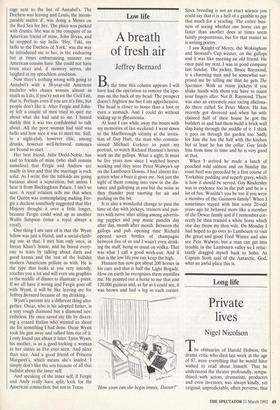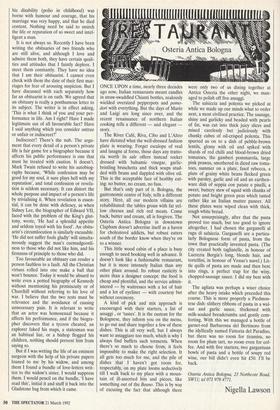Long life
Private lives
Nigel Nicolson
The obituaries of Harold Hobson, the drama critic who died last week at the age of 87, were everything that he would have wished to read about himself. That he understood the theatre profoundly, sympa- thised with actors, dramatists, producers and even investors, was always kindly, yet original, unpredictable, often perverse, that
his disability (polio in childhood) was borne with humour and courage, that his marriage was very happy, and that he died content. Nothing need be said to smirch the life or reputation of so sweet and intel- ligent a man.
It is not always so. Recently I have been writing the obituaries of two friends who are still alive, and although I love and admire them both, they have certain quali- ties and attitudes that I faintly deplore. I meet them constantly. They have no idea that I am their obituarist. I cannot even check with them the date of their first mar- riages for fear of arousing suspicion. But I have discussed with each separately how far an obituarist is on oath. We agreed that an obituary is really a posthumous letter to its subject. The writer is in effect asking, `This is what I think of you and your per- formance in life. Am I right? Have I made legitimate use of all favourable fact? Have I said anything which you consider untrue or unfair or indiscreet?'
Indiscreet? There's the nub. The argu- ment that every detail of a person's private life is fair game for a biographer because it affects his public performance is one that must be treated with caution. It doesn't. Mark Twain refused to write his autobiog- raphy because, 'While confession may be good for my soul, it sure plays hell with my reputation', and total confession or revela- tion is seldom necessary. It can distort the whole purpose and impact of a person's life by trivialising it. When revelation is essen- tial, it can be done with delicacy, as when Sidney Lee, the biographer of Edward VII, faced with the problem of the King's glut- tony, wrote, 'He had a splendid appetite and seldom toyed with his food'. An obitu- arist's circumlocution is similarly excusable. 'He did not suffer fools gladly' will simulta- neously suggest the man's curmudgeonli- ness to those who did not like him, and his firmness of principle to those who did.
Too favourable an obituary can render a person faultless to a fault. All the Christian virtues rolled into one make a ball that won't bounce. Today it would be absurd to write even a potted biography of Kennedy without mentioning his promiscuity or of Churchill without referring to his love of war. I believe that the two tests must be relevance and the avoidance of causing unnecessary pain. It is relevant to write that an actor was homosexual because it affects his performance, and if the biogra- pher discovers that a tycoon cheated, an explorer faked his maps, a statesman was an habitual liar, or a bishop flogged his children, nothing should prevent him from saying so.
But if I was writing the life of an eminent surgeon with the help of his private papers loaned to me by his widow, and among them I found a bundle of love-letters writ- ten to the widow's sister, I would suppress them. I would pencil on the bundle, 'I have read this', initial it and stuff it back into the Gladstone bag from which it came.



























































 Previous page
Previous page